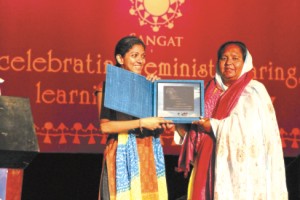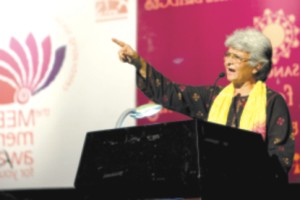| Event
“Walls turned Sideways are Bridges”
Sangat, a voluntary organisation's effort to unite South Asians
Tamanna Khan
The morning of March 9, 2010 was a different one for the administration of Punjab government, Pakistan. It witnessed the largest gathering of women farmers with thapas (a stick used to wash/ strike clothes) in their hands shouting Maliki ya Maut (ownership or death). The procession was part of the land rights movement of the Anjuman Muzareen Punjab (AMP) or the Tenants Association Punjab and Akeela Naz, a tall, bold figure clad in the traditional salwar and kurta, was the leader of the “Thapa force”.
During the British rule many Muslim and Christian families from east Punjab were relocated to the dry forests of the now Pakistani Punjab with the promise of land rights. In return they had to clear the jungles and make the land fit for commercial agriculture. However, from the British period to date the settlers remained tenants instead of owners and kept on paying heavy revenue to companies and military agencies, which in turn leased the land from the government. To protest against the unfair system, the peasants of the region formed the Anjuman Muzareen Punjab demanding legal rights over the lands that they have been cultivating for other's benefit for almost a century. However their attempt to meet the authority with their claim was repeatedly crushed by police and paramilitary attacks.
 |
| Akeela Naz receiving the Meeto Memorial Award 2010 from 2009’s winner Anusheh Anadil. Photo: Zahedul I Khan |
Akeela belongs to one of the million landless farmers’ family of Punjab in 1976 who have witnessed the exploitation of the farmers at the hands of corrupt governments. Unable to afford a college education, young Akeela, joined the AMP and began organising women across the Punjab province showing them how they could guard their lands and families from police attacks. In 2008-2009, Akeela registered the Peasant Women's Society to equip women with education and vocational training, which was essential for the movement. On March 2010, in a pre-planned long march by AMP, Akeela came out with her full force in a massive public rally. Ultimately, the government was forced to give in to AMP's demand. However, Akeela has not stopped her work, she says, “I have started yet another movement under Peasant Women Society's banner that women should have entitlement to the land in which they worked and cultivated seeds. However they are not entitled to land. So I am working with specific women issues like inheritance and health.”
Because of her brave leadership, Akeela Naz has been chosen for the Meeto Memorial Award 2010, presented at the National Theatre hall at Shilpakala Academy, Dhaka on October 1, 2010. Sangat, a network of South Asian gender activists presented the award as well as celebrated its twenty five years of work of bringing the NGOs and CSOs (Civil Society Organisations) of South Asia under one umbrella.
Sangat in cooperation with ANHAD (Act Now for Harmony and Democracy), a voluntary organisation initiated the Meeto Memorial Award in 2009. Through the award it recognises the contribution of young South Asians who work towards communal harmony, peace, justice and human rights. The award is named after Meeto (Kamaljit Bhasin- Malik), a scholar, activist and dancer, who was the first primary coordinator of SAHR (South Asians for Human Rights). Unfortunately, the life of this promising young woman came to an abrupt end on 2006 before she could finish her pre-doctoral research, later published under the title “In the Making: Identity Formation in South Asia”. To commemorate her memory, well known social activist and scholar Kamla Bhasin, Meeto's mother and the key person of Sangat instituted the award. The Award comprises of one lakh Indian Rupees, a citation and a memento and is announced in October every year. In 2009, Anusheh Anadil, singer and cultural activist from Dhaka and Laxmi Ben Vankar from India shared the award.
 |
| Kamla Bhasin, A Key Force Behind Sangat. Photo: Zahedul I Khan |
Sangat, which in Urdu and Hindi means gathering or community of like-minded people, has been working to increase the cooperation and solidarity amongst NGOs and CSOs in South Asia in their work for equality, justice, peace and democracy. Sangat was started through a workshop for gender trainers organised by FAO-NGO South Asia Programme and the Institute of Development Policy Analysis and Advocacy, Bangladesh, in April 1998, at Koitta, Bangladesh. Kamla Bhasin explains Sangat's scheme saying, “The idea was to build capacities for younger women and men in South Asia to work strongly for justice and peace and to do networking between countries and to make South Asia a better place for all, particularly for women and girls.” Although the network's official launching was on 1998, its history dates back to 1975-76 when Kamla Bhasin was heading a project on “Role and Training of Change Agents” at FAO. During that time, she organised regional and national workshops, training programmes for field level NGO workers and policy makers and tried to create linkage between innovative NGOs in South Asia. In Kamla's word the courses offered by Sangat started in 1978 under FAO. “The same work, we continue through Sangat. So we do not separate the two histories,” she says.
While facilitating information sharing among neighbouring countries, Sangat develops and updates gender trainers, materials and resources across the region through training courses, workshops and exchange visits. However, it does not limit itself to theoretical courses rather to reach out to the larger section of the society they arrange cultural events promoting peace, solidarity and cooperation across borders. “One of the main things that Sangat does is run feminist capacity building courses for women from grass-root level small organisations spread all over the hinterlands of South Asia,” says Amrita Nandy Joshi, coordinator of Sangat.
The participants of the training courses range from development workers, journalists, lawyers, dancers, activists, writers, researchers, politicians, revolutionists to police officers. Sharing her experience of the course, Jwala Kumari, a Nepali parliamentarian and political leader of Unified Communist Party of Nepal (Maoist), says, “Since I come from Nepal where preparation of the Constitution is still on the go, I want to exchange views with participants of the nine countries on what laws are available in their countries to protect the rights of women and after returning to Nepal, I shall try to incorporate those based on my understanding.”
For other participants joining the course is akin to rediscovering their feminist identity. A participant from the Middle East says how she was not comfortable in calling herself a feminist as the term is often used as a derogatory label. However, after attending the course she understands that even her work of fighting against poverty falls under the realm of feminism as poverty is a by product of our patriarchal society that supports capitalism.
Sangat works through its partner NGOs and CSOs in Afghanistan, Bangladesh, Pakistan, India, Nepal, Sri Lanka and Burma and international donor agencies mainly from Europe, who support NGO initiatives. The network is run by an advisory body called the Core Group that comprises 20 feminist scholars, development experts, trainers, human rights and peace activists from Bangladesh, India, Nepal, Pakistan and Sri Lanka. Khusi Kabir of Nijera Kori, one of the Core Group members of Sangat from Bangladesh, shares her experience of working with Sangat, “Before joining Nijera Kori, I was at Brac and Kamla was at a FAO programme, where she held workshops on collaboration amongst field-level activists of different countries of Asia. I came to know her and we became friends. After joining Nijera Kori in 80s, the similarity in our thoughts and work has led us to work together.” She also points out that different programmes of Sangat are held at different times by different partner organisations. This year the feminist capacity building course is being at Brac Centre in Rajendrapur in partnership with Nijera Kori, Bangladesh and with support of Action Aid International, ICCO (Interchurch organisation for development cooperation) and Global Fund for Women.
The history of South Asia is stained with political and economical conflict between and within the region. Sangat's effort of building bridges of friendship between the countries through multicultural courses and promoting works of South Asian women who advocate change is indeed a unique endeavour.
Copyright
(R) thedailystar.net 2010 |
|
